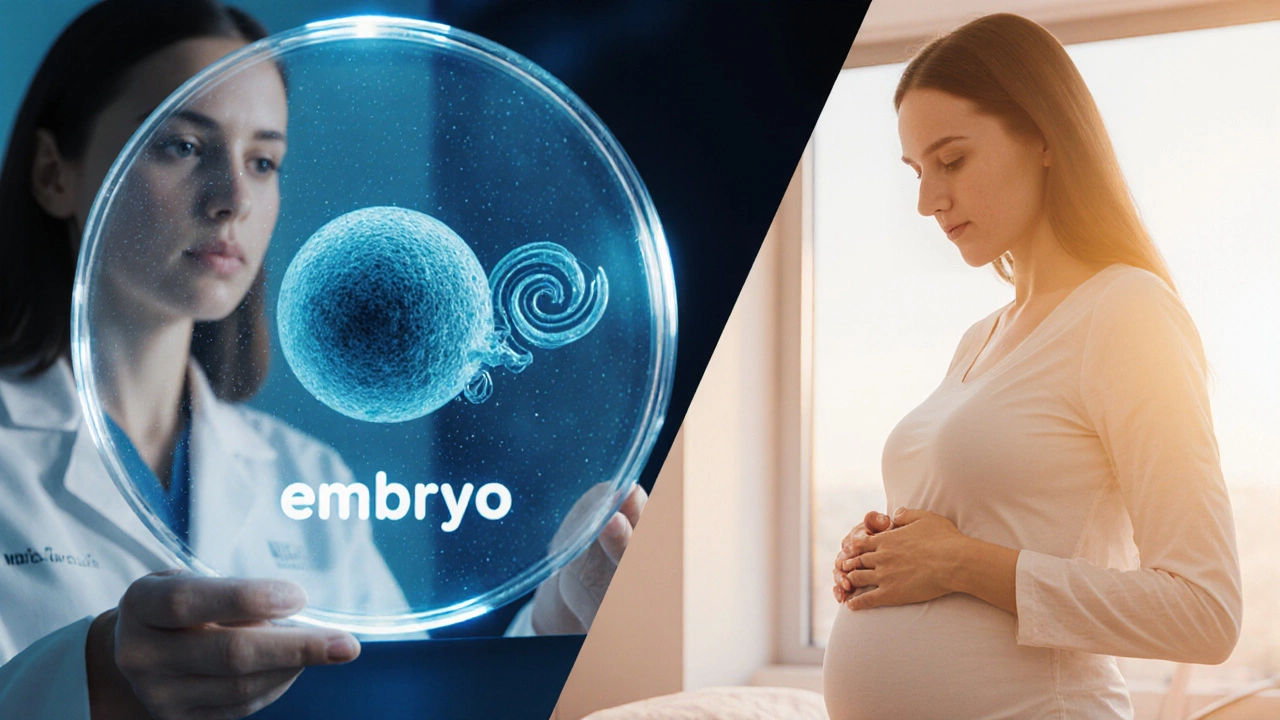IVF Parentage Calculator
This calculator helps determine who is considered the biological mother in different IVF scenarios based on egg source, gestational carrier involvement, and legal considerations.
When you hear the term biological mother of an IVF baby, you might picture the woman who carried the pregnancy. In reality, the answer splits into genetics and gestation, and the two often belong to different people. Let’s untangle the roles, the science, and the legal angles so you know exactly who wears the “biological mother” badge in modern IVF scenarios.
What Does “Biological Mother” Mean in IVF?
In a conventional pregnancy, the mother is both the genetic source of the egg and the person who gives birth. IVF separates those two functions:
- In vitro fertilization (IVF) is a assisted‑reproduction technique where an egg and sperm are combined in a lab dish to create an embryo before it is placed in a uterus.
- The genetic mother provides the egg that contributes half of the child’s DNA.
- The gestational mother (or carrier) houses the embryo and carries the pregnancy to term.
Both can be the same person, but when donors or surrogates enter the picture, the labels diverge.
When the Egg Comes From a Donor
An egg donor is a woman who provides ova for fertilization. Her genetic contribution makes her the genetic mother of any child born from those eggs, regardless of who later carries the pregnancy.
Egg donation is common for:
- Women with premature ovarian failure or low ovarian reserve.
- Same‑sex male couples seeking a genetic link.
- Individuals who want to avoid passing on hereditary conditions.
Legally, most jurisdictions treat the donor as a “biological parent” only in a genetic sense. Birth certificates typically list the woman who gives birth as the mother, unless a pre‑birth order or surrogacy agreement states otherwise.
Gestational Carriers and Surrogacy
A gestational carrier (or gestational surrogate) receives an embryo created from another couple’s or donor’s gametes. She has no genetic link to the baby, making her the gestational mother but not the genetic mother.
Key points for surrogates:
- Medical screening ensures a healthy uterine environment.
- Legal contracts define parental rights before implantation.
- After birth, the intended parents are usually recognized as legal parents, pending court approval.
Because the surrogate’s DNA isn’t involved, she isn’t considered the biological mother in a genetic sense.
Mitochondrial Donation: A Third Genetic Contributor
In rare cases, a mitochondrial donor provides healthy mitochondrial DNA (mtDNA) to prevent mitochondrial diseases. The child’s nuclear DNA still comes from the egg and sperm donors, but the mtDNA originates from a third woman.
While the mitochondrial donor’s contribution is tiny-less than 0.1% of total DNA-it still earns the label “genetic contributor” in scientific literature. Most legal systems, however, continue to recognize only the egg donor as the genetic mother.

Legal vs. Biological Motherhood: How Courts Decide
Legal motherhood hinges on local statutes. In India, for instance, the Assisted Reproductive Technology (Regulation) Act2021 recognizes the woman who gives birth as the mother on the birth certificate, even when an egg donor is used. Courts can issue a “pre‑birth order” to assign parental rights to the intended mother before delivery.
In the United States, laws vary by state. California treats the intended parents as legal parents if they have a valid surrogacy contract, whereas New York only recently permitted compensated surrogacy, still requiring a court order for parental rights.
For parents‑to‑be, it’s essential to consult a reproductive‑law attorney familiar with the jurisdiction where the IVF cycle and birth will occur.
How to Identify the Biological Mother in Different IVF Scenarios
| Role | Genetic Contribution | Gestational Role | Typical Legal Status |
|---|---|---|---|
| Genetic Mother (Egg Donor) | Provides egg DNA (≈50% of child’s genome) | Usually does not carry pregnancy | Recognized as biological parent; legal motherhood depends on consent forms and local law |
| Gestational Mother (Surrogate) | No genetic link | Hosts embryo to term | Listed as mother on birth certificate unless a pre‑birth order transfers rights |
| Intended Mother (Couple’s Partner) | May provide egg (if using own gametes) or none (if using donor) | May or may not be gestational mother | Often recognized as legal mother after court approval or contract enforcement |
| Mitochondrial Donor | Supplies mtDNA (tiny fraction of total DNA) | Usually not gestational mother | Rarely recognized legally; mainly a medical designation |
Checklist: Determining the Biological Mother in Your IVF Plan
- Identify the source of the egg:
- Own egg → you are the genetic mother.
- Anonymous donor → donor is the genetic mother.
- Known donor (friend/family) → donor holds genetic link.
- Confirm who will carry the pregnancy:
- Self → you are also the gestational mother.
- Gestational surrogate → surrogate is gestational mother.
- Review legal documents:
- Donor consent forms.
- Surrogacy contract.
- Pre‑birth order or court filing.
- Consider mitochondrial donation if applicable.
- Consult a fertility lawyer to align medical facts with legal status.
Common Misconceptions
Misconception 1: The woman who gives birth is always the genetic mother.
Reality: In IVF with egg donation or surrogacy, the birth mother may have zero genetic ties.
Misconception 2: Egg donors have parental rights automatically.
Reality: Most donor agreements waive all rights, making the donor a purely genetic contributor.
Misconception 3: “Biological mother” is a legal term.
Reality: It is a scientific label; legal motherhood follows statutory definitions and contracts.
Mini‑FAQ
Frequently Asked Questions
Can an egg donor also be the gestational mother?
Yes, if the donor chooses to carry the embryo herself. In that case, she is both the genetic and gestational mother, just like a natural pregnancy.
Does mitochondrial donation create a third mother?
Scientifically, a mitochondrial donor adds a minuscule DNA segment, but legal systems usually do not treat her as a mother. The term “mitochondrial mother” is used only in medical literature.
If I use my partner’s sperm and a donor egg, who is the biological mother?
The egg donor is the genetic (biological) mother. If you carry the pregnancy, you are the gestational mother, but not the genetic mother.
Can a surrogate claim parental rights after birth?
In most jurisdictions, a properly executed surrogacy contract and a pre‑birth order prevent the surrogate from acquiring parental rights. However, if the contract is missing or invalid, courts may consider her the legal mother.
What paperwork proves who the genetic mother is?
The donor’s signed consent form, the clinic’s genetic testing report, and any DNA‑profiling documentation serve as proof of genetic parentage.
Next Steps for Prospective Parents
1. **Map your desired family structure.** Decide whether you need an egg donor, a gestational carrier, or both.
2. **Choose a reputable fertility clinic.** Look for accreditation, success rates, and transparent donor screening policies.
3. **Secure legal counsel early.** A reproductive‑law attorney will draft donor agreements, surrogacy contracts, and file any pre‑birth orders.
4. **Plan for emotional support.** Counseling helps all parties-intended parents, donors, and surrogates-navigate the complex feelings around genetics and motherhood.
5. **Document everything.** Keep copies of consent forms, medical records, and court filings. Proper paperwork protects everyone's rights and clarifies who the biological mother is.
Understanding the difference between genetic and gestational roles removes the mystery from the phrase “biological mother of an IVF baby.” Whether you’re the egg donor, the surrogate, or the intended parent, clear definitions and solid legal safeguards ensure that everyone knows their place in the family story.





